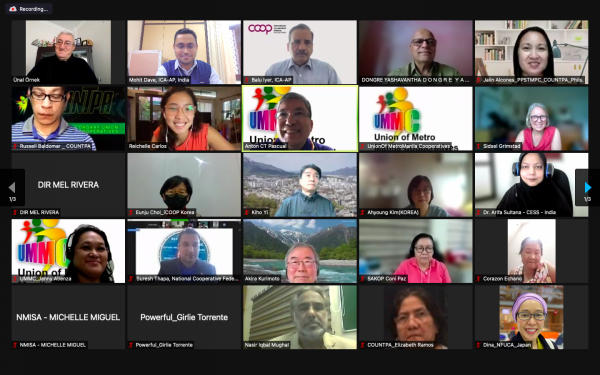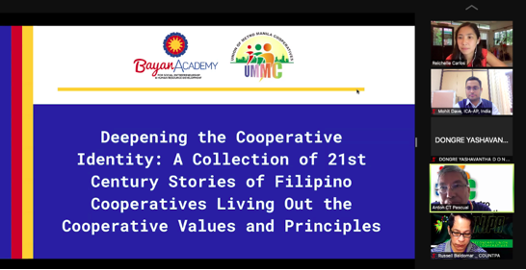
ICA-AP Committee on Cooperative Research (CCR) launched COOP Colloquium on 24 February 2022 to start an academic dialogue on issues that are relevant to cooperative education and research. The first colloquium focused on the book, “Deepening the Cooperative Identity: A Collection of 21st Century Stories of Filipino Cooperatives by the Union of Metro Manila Cooperatives (UMMC) and the Bayan Academy. 58 participants from 15 countries joined the webinar.
Dr. Yashvantha Dongre, Chairperson, ICA-AP CCR welcomed the participants. He said that the experience of cooperative scholarship across the Asia and Pacific region is rich and diverse and ICA-AP CCR would like to bring these together in COOP Colloquium to share, inform and learn. Each iteration will focus on a theme, present different perspectives and have a colloquium. Digital and social media platforms will be used to promote COOP Colloquium and have a conversation around cooperative education and research.
Mr. Balasubramanian Iyer, Regional Director, ICA-AP in his opening remarks, welcomed the initiative and the need to discuss the theme, ‘Deepening the Cooperative Identity.’ The ICA-AP regional office has had several consultations at the country and sub-regional level to get views and opinions from the cooperative movement. He commended the work of the Union of Metro Manila Cooperatives (UMMC) and Bayan Academy from the Philippines.
Ms. Reichelle Carlos, Program Director, Bayan Academy made a brief presentation on its aim to further deepen the understanding and appreciation of the Cooperative Identity as well as to promote the sector’s significant contributions to national development, particularly in the areas of poverty alleviation, community building, social justice, and economic growth. She also discussed the book – Deepening the Cooperative Identity: A Collection of 21st Century Stories of Filipino Cooperatives. Bayan Academy, through the Bayan Innovation Group (BIG), aims to be the leading think tank of social entrepreneurship in the country. BIG aims to consolidate Bayan Academy’s wealth of knowledge resources and transform these into digital learning innovations. Part of what BIG does is to use research and turn them into meaningful insights that could be used by leaders to deepen their social impact and contribute to inclusive nation-building.

Fr. Anton CT Pascual, Chairperson, Union of Metro Manila Cooperatives (UMMC) spoke about their work as the lead cooperative tertiary union in the National Capital Region (NCR) in the Philippines. UMMC aims to be a champion in the revitalization of the co-op union system through education, training and policy engagements. He mentioned that the book contains 25 evidence-based case studies narrating the best practices of some of the most successful cooperative enterprises. It also contains thought pieces from 12 of the most respected cooperative movement leaders in the country. The collection shows how cooperative ideologies, values, and principles can – and should – serve as a guideline for a successful cooperative enterprise. More than success stories, the case studies and stories in the collection are intended to be used as UMMC’s learning materials for the most comprehensive training program on cooperative values and principles up to date in the country.
Dr. Sidsel Grimstad & Dr. Eunju Choi, Vice-Chairpersons, ICA-AP CCR shared their closing remarks. They thanked the presenters and hoped it will inspire the readers to go back to the core of the cooperative ideological framework. Deepening the Cooperative Identity challenges its readers to deliver the cooperative paradigm in the Philippines and use it as a tool for poverty reduction through the collective empowerment and cooperation of its members.
Mr. Mohit Dave, Secretary, ICA-AP CCR moderated the webinar. He mentioned that the ICA-AP Committee on Cooperative Research (CCR) was established in the year 2000 to promote and support the initiation and furtherance of research activities within cooperatives and research organizations at regional, national and local levels, to enhance their social and economic effectiveness. It has members working in the field of research and academia and those in the member organisations of the ICA-AP. During its 22 years of existence, it has organized several regional research conferences and local seminars.



